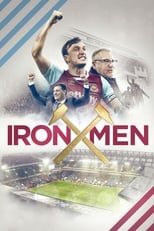People will travel to see something unique: centuries old castles and cathedrals, or even an old football stadium with 100 years of tradition and raucous, rabid, singing West Ham fans. Iron Men brings us the story of these fans, whose club moved from their 104 year old Boleyn Ground to the former Olympic Stadium.
Why move?
One of the most informative books I’ve read about the business of modern football is “The Club“, by Joshua Robinson and Jonathan Clegg. They talk about an “aha” moment in football, when Premier League owners realized that their old, decaying stadiums were a marketing detriment. Inadequate restrooms with long lines and urine flowing down the path were just one sorry example when compared to the worshipful American NFL stadiums that were generating huge ticket revenues for their owners. These billionaire NFL owners were now buying Premier League clubs and bringing the modern game to England.
So when England built a stadium for the 2012 Olympics, they also arranged for a football club to take over the grounds after the end of the Games. West Ham won the controversial bid, and the film covers the effect on the fans during their last season in the Upton Park neighborhood.
“It ain’t the stadium, it’s the people. The people are West Ham.”
An independent production by Directors Paul Crompton and Suri Krishnamma, Iron Men is a very positive film while also being balanced. The new stadium will increase capacity from 35,000 to 57,000, but it is 3.5 miles away, or about 40 minutes by public transit.
We see the impact on several very long time fans: Mabel Arnold is 100 years old and has seen almost every game. Matt Datson attends every game even though he is unsighted. Mark Gevaux is the very energetic Rib Man of West Ham, who hopes he will be able to stay in business even though he cannot afford to run his rib stand at the new stadium site. Gary Firmager is the hawker of his 27-year fanzine “Over Land and Sea” (OLAS); he shuts down the publication of his program with the last Boleyn game in 2016.
The film also interviews people inside the organization, in the milieu of the old and new facilities (these aren’t just talking head interviews). Captain Mark Noble, who has only played for West Ham in his then 16 year career, is a home town hero to fans. There are scenes with owners David Sullivan and David Gold who explain the advantages of the move: new modern stadium = more revenue = big signings = championships. (In my research, I learned these men earned their billions through hard work and pornography.)
Vice-Chairman Karren Brady (now Baroness Brady) features briefly; she orchestrated the stadium move and was also a role model for the owner character in the comedic Apple TV series Ted Lasso.
The aftermath of the move
The film ends with the first game in the new grounds, now renamed as London Stadium. However, controversy has continued to surround the stadium. Its owners, the London Legacy Development Corporation (LLDC), in Nov-2020 sued its former law firm for having left a loop hole in the leasing contract. West Ham took advantage of the situation by adding additional seats, for which it does not have to pay LLDC.
There have also been controversies, both recent and over the almost 10 years since the deal was first announced. Even prior to the pandemic, the stadium had low actual attendance, as apparently many season ticket holders do not show up for all games (just like American stadiums). That and the distance from the pitch contribute to poor fan atmosphere. During the pandemic, new seats were added to move fans closer to the pitch (and under the loop hole). Early on there were complaints about West Ham’s 99-year lease at £2.5m a year, an amount that implies a great deal of future taxpayer subsidies.
Will the Hammers and their enthusiasm return? The pandemic has made a very dark period for football and all professional sports. But even without the pandemic, it seems this move required a lot of what we refer to in the States as magical thinking. A good example of that was the promotional video created by AD Films (no longer available as of Jan-1-2024).
In Conclusion
Iron Men is an engaging documentary about football fans and the end of life of a stadium while it was still breathing and undulating. I’ve often wondered why so many soccer movies seem to leverage West Ham fandom, and this film helped explain that. Watch Final Score if you wish to see the stadium blown up, and watch Bobby for a film about West Ham’s greatest player, Bobby Moore.
8 Soccer Movie Mom Rating = 8
Resources:
- Released: 2017-03-03 (UK)
- 75 minutes
- I watched this on Amazon Prime
- IMDB
- Director: Paul Crompton , Suri Krishnamma
- Stars: Mark Noble
- Watch the Trailer
- On Facebook

